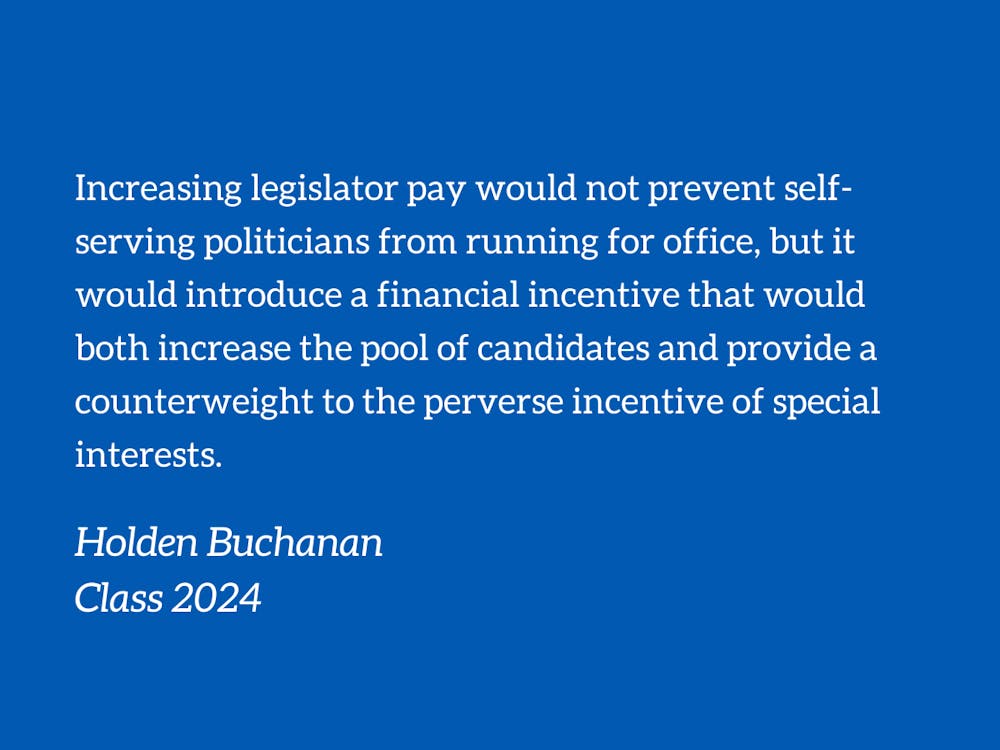On the first day of my summer internship at the environmental lobbying group, North Carolina League of Conservation Voters, I walked into the Legislative Building suited up, excited to see our representative democracy at work. As I opened the chamber doors for a House voting session, I went from an ear-to-ear smile to a confused expression. This group should be playing bingo or telling me how things were back in their day. Why did they look like this? I snapped out of my befuddled trance and took a seat on the bench.
After the voting session, my boss and I sat down on some chairs outside the building, waiting for an Agricultural committee meeting. I asked him (very intelligently), “What’s up with all the old people in there?”.
He responded with a question: “How much do you think a state legislator makes?”
“I don’t know…$100,000?”.
“Lower”, he said.
“$70,000”.
“Lower”, he said again.
“It cannot be less than $40,000,” I stated confidently.
Tired of the back and forth, he finally enlightened me: “Legislators get paid less than $14,000. Most are independently wealthy, or retired, or both.”
This unimaginable fact baffled me, but my boss was right. Legislators in the Old North State are among the lowest paid in the country, earning a base salary of $13,951 in addition to a mileage stipend of 29 cents per mile and a per diem of $104 during legislative sessions. I believe that this pay structure has seriously negative ramifications for our legislators and the public.
The financial precondition to becoming a state legislator favors the status quo: old, rich, white, men. In fact, the most common occupation for state legislators is retiree (or simply “legislator”). Unless you are retired or independently wealthy, it is extremely difficult to take on this “part-time” legislative role without a stable additional income. The position requires state representatives to forgo three to four work days each week to serve (often away from their home county) in Raleigh. They continue this schedule for an unspecified number of weeks, as North Carolina is one of 11 states without a session length limit. The vast majority of legislative session limits throughout the country range between 20 and 100 legislative days. Some legislatures do not even meet every year. The 2021-2022 NC session, which occurs every year, lasted 199 legislative days.
With the circumstances in North Carolina, it is not surprising to me that white men — the second-highest earners in the United States — dominate the field. Despite making up 51% of the North Carolina population, only 29% of state legislators are women. The state’s population is 22% African American and 10% Latino but those groups make up only 20% and 0% of the legislature, respectively. Although there are many factors that influence the demographics of the NC General Assembly, the financial precondition and the time commitment to being a state legislator are among the factors impeding fair representation the most.
It seems to me that insufficient income incentivizes politicians to seek personal interests. Take the Agriculture House Standing Committee as an example. Jimmy Dixon, the senior chair, is a turkey farmer. In the first quarter of the year, half of Dixon’s $81,775 in campaign contributions came from the agriculture business, including $37,150 from various individual farmers and agriculture businessmen and $5,200 from Smithfield. Dixon sponsored the Regulatory Reform Act of 2023, which destroys environmental protections and loosens regulations for farmers. The chair, Jeffrey McNeely, runs a feed milling company and is subject to the same conflict of interest.
This trend is consistent among other committees. The three co-chairs of the Energy and Public Utilities House committee are Dean Arp, Kyle Hall and Matthew Winslow. Rep. Arp is the founder of Arp Engineering, which works directly with the construction industry. Rep. Hall is a realtor and Rep. Winslow is a home builder.
Politicians are not altruistic; they are rational and self-interested like everyone else. Increasing legislator pay would not prevent self-serving politicians from running for office, but it would introduce a financial incentive that would both increase the pool of candidates and provide a counterweight to the perverse incentive of special interests.
Finally, the pay structure simply makes some politicians less engaged. During my days at the General Assembly, I have seen representatives multitasking during voting sessions and committee meetings, often completing tasks for their other jobs. I have witnessed politicians ask questions that reveal their lack of understanding of the legislation. And, honestly, I do not blame the politicians. They have an obligation to execute the job that is going to financially provide for themselves and their families to the fullest extent. Their state legislature job does not satisfy this condition.
State politics matter. Whether you know it or not, the policies passed in that Legislative Building affect your day-to-day life. Senate Bill 20, passed only a few months ago, restricts abortions after 12 weeks. Senate Bills 512 and 749 awarded the legislator more control over the election process and stripped power from the executive branch. Senate Bill 747, if passed, will make absentee voting much more difficult — especially for college students.
The taxpayers of North Carolina deserve a diverse, well-intentioned, attentive group of legislators. The General Assembly should pass a bill increasing pay to expand the presence of these qualities, or alternatively form an independent committee to determine legislator pay and benefits. I truly believe that increasing the pay of state legislators will lead to a General Assembly that better represents the desires and demographics of the public.
Holden Buchanan is a Trinity senior.
Get The Chronicle straight to your inbox
Sign up for our weekly newsletter. Cancel at any time.

